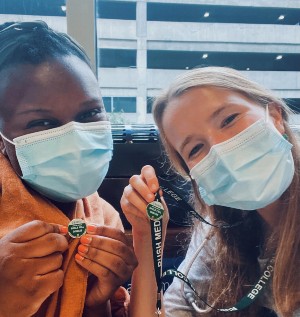Sickle cell disease (SCD) is a common inherited blood disorder that affects nearly 100,000 Americans — most of whom are Black. SCD causes red blood cells to bend into a crescent shape, which can cause chronic pain, multi-organ failure and stroke.
Racial biases and lack of knowledge regarding the complexity of SCD care have led to inequities in funding, research and proper patient care. Here at Rush University Medical Center, SCD is a prevalent disease seen in our patient population, and students at Rush University are working to improve care for these patients.
 After gaining understanding of the inequities in SCD care and education, fourth-year Rush Medical College students Alice Burgess (right) and Orrianne Morrison (left) worked on a project to outline the gaps in the care and knowledge of SCD. The team's project focused on making changes to better educate medical students, clinicians and residents about the manifestations of SCD and to make changes in the flow of treatment of SCD within the hospital.
After gaining understanding of the inequities in SCD care and education, fourth-year Rush Medical College students Alice Burgess (right) and Orrianne Morrison (left) worked on a project to outline the gaps in the care and knowledge of SCD. The team's project focused on making changes to better educate medical students, clinicians and residents about the manifestations of SCD and to make changes in the flow of treatment of SCD within the hospital.
“There are a lot of gaps in knowledge when it comes to sickle cell disease. Manifestations and methods of treatment of sickle cell disease are unknown to a lot of us even after completing the first and second year of medical school," says Morrison. “Unfortunately, sometimes these gaps in knowledge persist, and that can contribute to poor care for patients."
The team surveyed fellow students and found that 70% to 75% of their classmates had gaps in their knowledge of SCD treatment, and 82% agreed that they need more education about SCD.
“We realized our limited SCD education during our pre-clerkship years was impacting our ability to provide equitable care on the floors," explains Burgess. “Gaps in knowledge are not limited to medical education — while cystic fibrosis (CF) affects less than one-third the number of patients with SCD, CF receives more than four times the national research funding. There is a paucity of funding for crucial pathophysiology and treatment research, along with holistic treatment centers — especially when compared with other genetic disorders like CF and hemophilia."
Morrison and Burgess worked with SCD patients to develop a three-pronged approach to address existing inequities in SCD education and patient care, which included the following:
- Redesigning the pre-clerkship curriculum to incorporate SCD into additional organ-system modules
- Conducting compensated community focus groups to elevate SCD patients' voices and expertise
- Implementing innovative patient care programs (such as a multidisciplinary SCD team, a pediatric-to-adult transition service, and individualized pain plans on EPIC) in order to coordinate care across health care settings and patient ages — and ultimately improve long-term outcomes
The preliminary results of the group's work show that the majority of medical students lack knowledge regarding complications and treatment of SCD, and factors such as bias, delays in treatment, lack of multidisciplinary support and lack of prioritization are significant challenges in patient access to adequate care.
“We hope to continue this work and obtain a larger sample size of both learners and patients to confirm our initial findings," explains Burgess. “Sharing our vision with medical educators will impart change on SCD education and the future of sickle cell patient care."
What you can do
SCD is a global health problem. You can help people with SCD with the following activities:
- Donate blood to support transfusions. You can donate even if you have the sickle cell trait.
- Advocate for better treatment, education and research.
- Educate others about sickle cell disease and sickle cell trait.
- Get tested for sickle cell trait if you are of African descent and do not know your status.

